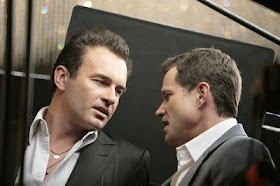 As someone who loves science fiction, it’s unfortunate that I’ve got an almost irrational resistance to programming on Syfy. It goes all the way back to their brutal treatment of Farscape, and while logic tells me that Battlestar Galactica should have made up for that misstep, I still find it hard to trust the network to this day. Or maybe it’s just that most of their programming sucks, and is aimed at the lowest common denominator.
As someone who loves science fiction, it’s unfortunate that I’ve got an almost irrational resistance to programming on Syfy. It goes all the way back to their brutal treatment of Farscape, and while logic tells me that Battlestar Galactica should have made up for that misstep, I still find it hard to trust the network to this day. Or maybe it’s just that most of their programming sucks, and is aimed at the lowest common denominator.Needless to say, I skipped Warehouse 13 when it was on last year, and once I started watching this set I assumed I had made the right decision, as the first four or five episodes (out of 12) aren’t much to write home about. The warehouse in question is located in the hinterlands of South Dakota. It houses a seemingly infinite number of artifacts from history – artifacts that inexplicably contain strange and unique powers (you’ve seen it before at the end of Raiders of the Lost Ark and the beginning of Kingdom of the Crystal Skull). For instance, Edgar Allen Poe’s quill makes whatever it writes happen, while Lewis Carroll’s mirror contains the spirit of an evil Alice.
There’s a schlubby caretaker named Artie Nielsen (the always great Saul Rubinek), who in the 90-minute pilot enlists the aid of two Secret Service agents, Pete Lattimer (Eddie McClintock) and Myka Bering (Joanne Kelly), both of whom are far too attractive for their professions. Their job is to trek across the U.S., hunt down artifacts, and bring them back to the warehouse – but not before getting in all manner of trouble first. There’s also the owner of Warehouse 13, the mysterious Mrs. Frederic (C.C.H. Pounder), who instills fear with her steely gaze, as well as Leena (Genelle Williams), a quiet, possibly psychic woman who runs the B & B where the Warehouse employees reside, which is one of the show’s stranger narrative moves. Why can’t they just get apartments, like normal people?
Read the rest of this DVD review by clicking here and visiting Bullz-Eye.





